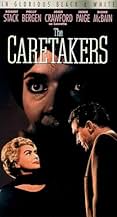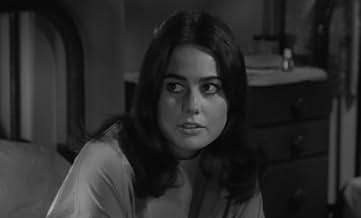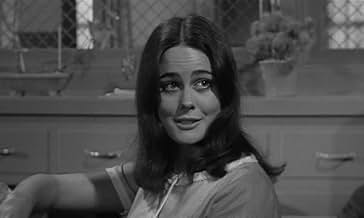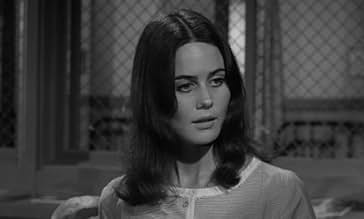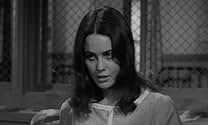Ajouter une intrigue dans votre langueMedical drama about mentally-ill patients and their professional caregivers, as well as the new group-therapy sessions aiming to replace the traditional physical restraint and electroshock t... Tout lireMedical drama about mentally-ill patients and their professional caregivers, as well as the new group-therapy sessions aiming to replace the traditional physical restraint and electroshock treatments.Medical drama about mentally-ill patients and their professional caregivers, as well as the new group-therapy sessions aiming to replace the traditional physical restraint and electroshock treatments.
- Réalisation
- Scénario
- Casting principal
- Nommé pour 1 Oscar
- 5 nominations au total
Ana María Lynch
- Ana
- (as Ana St. Clair)
Pamela Austin
- Student Nurse
- (non crédité)
Brian Corcoran
- Tony
- (non crédité)
George DeNormand
- Doctor
- (non crédité)
Avis à la une
I find this one of the most difficult films of its era to sit through; it is truly nerve-bending, asinine, and infuriating. if you look upon it as camp, it still is difficult to take unless you like the sight of bizarre creature polly bergen constantly throwing fits and screaming (it's truly horrific) and can tolerate the posturing hero and a story and scenes which purport to shed light on mental illness but is totally phony in every particular. diane mcbain is gorgeous and smug; joan crawford and constance ford as butch as they come; janis paige gives the most enjoyable performance in the film, or at least creates a somewhat believable character till she phonies out toward the end. it's pathetic that maltin and others would even consider taking this film seriously. it is a fairy tale put together by fly-by-night producers for a quick buck who wanted to make it look like one of those 50's/early 60's "message" social reform pictures, and people were dumb enough to accept that.
I don't know why I like this movie so much. I am sure that it has a lot to do with the fact that I love Joan Crawford, especially during the second half of her career. This particular film, in which she plays a severe and unyielding head nurse at a state psychiatric hospital, seems to have crystallized her persona of later years, much as "Mildred Pierce" did the same for the persona of the younger Crawford.
I have little to add to what other reviewers have said about "The Caretakers", except that it is not for everyone. The acting is over the top. The writing is awful. The treatment of the theme is very hypocritical in the sense that the film seems to mean well on the surface, but as it goes on, one feels that someone--the director, producer, et. al.--did their best to cram in as many gratuitous, sensationalistic moments as possible. This, naturally, defeats the film's original purpose, which was apparently to showcase more progressive methods for treating mental illness than were generally used at the time.
So why do I keep coming back to this picture at least once a year? Well, as I've said, it's mainly for Joan Crawford, but it's also for the film's camp value. EVERYONE here contributes to that, whether they knew it at the time or not. Polly Bergen chews her way through every scene with glorious relish, although she does become more subdued later on. Janis Paige--what can I say? She did a great job of portraying a mouthy slut. And so on and so forth.
I have read at least one account which stated that the filming of "The Caretakers" was besieged by script re-writes, which may explain the less-than-stellar results. Nevertheless, there's never a dull moment here, and as far as I'm concerned, that's a good thing. Movies are, after all, meant to entertain more than anything else, so if you watch this, watch it for that reason. And for good old Joan.
I have little to add to what other reviewers have said about "The Caretakers", except that it is not for everyone. The acting is over the top. The writing is awful. The treatment of the theme is very hypocritical in the sense that the film seems to mean well on the surface, but as it goes on, one feels that someone--the director, producer, et. al.--did their best to cram in as many gratuitous, sensationalistic moments as possible. This, naturally, defeats the film's original purpose, which was apparently to showcase more progressive methods for treating mental illness than were generally used at the time.
So why do I keep coming back to this picture at least once a year? Well, as I've said, it's mainly for Joan Crawford, but it's also for the film's camp value. EVERYONE here contributes to that, whether they knew it at the time or not. Polly Bergen chews her way through every scene with glorious relish, although she does become more subdued later on. Janis Paige--what can I say? She did a great job of portraying a mouthy slut. And so on and so forth.
I have read at least one account which stated that the filming of "The Caretakers" was besieged by script re-writes, which may explain the less-than-stellar results. Nevertheless, there's never a dull moment here, and as far as I'm concerned, that's a good thing. Movies are, after all, meant to entertain more than anything else, so if you watch this, watch it for that reason. And for good old Joan.
The Caretakers (1963)
It's hard to imagine actually going to the movie to see this movie as a kind of entertainment, because it is more an experience and an emotional plea than a good idea for a first date. There's no question it's powerful, sometimes disturbing, and acted and filmed with intensity. It is, in its own way, a great movie, if you measure it only in terms of being moved. It is also a questionable movie in how it portrays these women, all of whom are "borderline" cases, and none of whom are openly diagnosed for us. Still, some of the most radical behavior is stuff I've seen first hand, and so it isn't completely unreasonable.
The big theme is interesting to see in retrospect: this seems to be about the very first shifts from large hospital care of the mentally troubled to residential care. The key to this is the notion that the patients (they call them "consumers" now) can form small, interactive "families" that encourage emotional and psychological support. It's a kind of giant co-counselling, and I think it's been shown to work in the fifty years since.
There are several equally strong characters as the plot follows one and then another, from patient to nurse to doctor. Joan Crawford gives a steely, power-performance as the head nurse, though only now and then. Herbert Marshall briefly appears as an aging, wise figure in his second to last film. The rest of the cast is made of lesser known actresses who act out the different characters of this woman's ward with disarming conviction (or theatricality, if you don't buy into their illnesses). The lead doctor is played by Robert Stack who never strikes me as quite up to any acting task, but then he's just a figurehead of authority and progress. The movie is in the hands of the women.
Director Hall Bartlett doesn't have much of a career as director, but he's managed to get a terrific cinematographer, Lucian Ballard, to make it a visually brooding and beautiful experience. And the music is by one of the best, Elmer Bernstein. The copy of the movie that streams on netflix has a flaw in the sound which was unfortunate--the quiet portions, including some important conversations, were very quiet, and then when the music and screaming explodes in other scenes it'll hurt your ears. Very very loud. It made for a clumsy viewing, moving the volume up and down, backtracking now and then to see what we missed.
Expect to be impressed and moved and possibly slightly shocked. Overlook some of the neatened up psychology that is a product of both the era and the era the movie was made. And don't look for a surprising plot. Instead you'll get to know a few of the women and when it gets to the final scenes it'll be moving and even a little joyous. If you let it.
It's hard to imagine actually going to the movie to see this movie as a kind of entertainment, because it is more an experience and an emotional plea than a good idea for a first date. There's no question it's powerful, sometimes disturbing, and acted and filmed with intensity. It is, in its own way, a great movie, if you measure it only in terms of being moved. It is also a questionable movie in how it portrays these women, all of whom are "borderline" cases, and none of whom are openly diagnosed for us. Still, some of the most radical behavior is stuff I've seen first hand, and so it isn't completely unreasonable.
The big theme is interesting to see in retrospect: this seems to be about the very first shifts from large hospital care of the mentally troubled to residential care. The key to this is the notion that the patients (they call them "consumers" now) can form small, interactive "families" that encourage emotional and psychological support. It's a kind of giant co-counselling, and I think it's been shown to work in the fifty years since.
There are several equally strong characters as the plot follows one and then another, from patient to nurse to doctor. Joan Crawford gives a steely, power-performance as the head nurse, though only now and then. Herbert Marshall briefly appears as an aging, wise figure in his second to last film. The rest of the cast is made of lesser known actresses who act out the different characters of this woman's ward with disarming conviction (or theatricality, if you don't buy into their illnesses). The lead doctor is played by Robert Stack who never strikes me as quite up to any acting task, but then he's just a figurehead of authority and progress. The movie is in the hands of the women.
Director Hall Bartlett doesn't have much of a career as director, but he's managed to get a terrific cinematographer, Lucian Ballard, to make it a visually brooding and beautiful experience. And the music is by one of the best, Elmer Bernstein. The copy of the movie that streams on netflix has a flaw in the sound which was unfortunate--the quiet portions, including some important conversations, were very quiet, and then when the music and screaming explodes in other scenes it'll hurt your ears. Very very loud. It made for a clumsy viewing, moving the volume up and down, backtracking now and then to see what we missed.
Expect to be impressed and moved and possibly slightly shocked. Overlook some of the neatened up psychology that is a product of both the era and the era the movie was made. And don't look for a surprising plot. Instead you'll get to know a few of the women and when it gets to the final scenes it'll be moving and even a little joyous. If you let it.
One of the most common interest points for me in seeing any film is good concepts or when it takes on a subject not easy to tackle but always worth addressing. Something that was also covered in 'The Snake Pit' and 'One Flew Over the Cuckoo's Nest'. That was the case with 'The Caretakers'. Plus it had Joan Crawford (though the film was from her twilight years period) and Herbert Marshall in it, Crawford especially was more often than not worth watching despite her film choices being up and down.
'The Caretakers' is not one of her best films, nor does it contain one of her best performances. It is also not one of her worst on either count either. It struck me as a rather disappointing but still semi-watchable film that primarily suffers from how it deals with its subject. It may have had good intentions but it didn't translate in the execution, on this front 'The Caretakers' struck me as somewhat lacking in good taste which was somewhat frustrating.
It is benefitted by some very stylish and atmosphere-laden photography and the setting is suitaably austere. Elmer Bernstein's score has haunting moments.
Did not think much of the acting really, but some of the cast come off well. Polly Bergen may have had some terrible and rather limited dialogue, but she had a quite challenging role and manages to give the character force and nuance. Janis Page also does wonders with a role that sounds one-dimensional but makes it remarkably real.
Elsewhere, we have a stiff Robert Stack looking as if he wanted to be somewhere else, even for a sympathetic character he manages to make the character dull, and Crawford in a part that she should have been perfect for chewing the scenery to smithereens. Marshall also looks ill at ease in a part that has so little to it. None of the characters are written very well at all, too "black and white" so either characters too perfect or ones with not a redeeming bone in their bodies and never really in between (Page's being a possible exception). The direction is bland at best and schlocky at worst.
Although Bernstein's score has moments, too much is ridiculously overblown and over-emphasises the mood too much. The script goes well overboard on the camp, containing some real howlers, and is very awkward such as with poor Bergen in the early stages. The story is a real mess, what could have been a hard hitting and poignant film was instead rather gratuitously distasteful, offered very little insight into the subject, showed no respect for it or its characters and because of its numerous bouts of unintentional humour it was very difficult to take it seriously, something that the writing was not good in general at doing. Almost to an insulting degree.
Concluding, disappointing. 4/10
'The Caretakers' is not one of her best films, nor does it contain one of her best performances. It is also not one of her worst on either count either. It struck me as a rather disappointing but still semi-watchable film that primarily suffers from how it deals with its subject. It may have had good intentions but it didn't translate in the execution, on this front 'The Caretakers' struck me as somewhat lacking in good taste which was somewhat frustrating.
It is benefitted by some very stylish and atmosphere-laden photography and the setting is suitaably austere. Elmer Bernstein's score has haunting moments.
Did not think much of the acting really, but some of the cast come off well. Polly Bergen may have had some terrible and rather limited dialogue, but she had a quite challenging role and manages to give the character force and nuance. Janis Page also does wonders with a role that sounds one-dimensional but makes it remarkably real.
Elsewhere, we have a stiff Robert Stack looking as if he wanted to be somewhere else, even for a sympathetic character he manages to make the character dull, and Crawford in a part that she should have been perfect for chewing the scenery to smithereens. Marshall also looks ill at ease in a part that has so little to it. None of the characters are written very well at all, too "black and white" so either characters too perfect or ones with not a redeeming bone in their bodies and never really in between (Page's being a possible exception). The direction is bland at best and schlocky at worst.
Although Bernstein's score has moments, too much is ridiculously overblown and over-emphasises the mood too much. The script goes well overboard on the camp, containing some real howlers, and is very awkward such as with poor Bergen in the early stages. The story is a real mess, what could have been a hard hitting and poignant film was instead rather gratuitously distasteful, offered very little insight into the subject, showed no respect for it or its characters and because of its numerous bouts of unintentional humour it was very difficult to take it seriously, something that the writing was not good in general at doing. Almost to an insulting degree.
Concluding, disappointing. 4/10
Robert Stack, Joan Crawford, Susan Oliver, Herbert Marshall, Constance Ford, Van Williams and Diane McBain are "The Caretakers," a 1963 film also starring Polly Bergen, Janis Paige, Barbara Barrie, Ellen Corby and Sharon Hugueny who are the cared for. Robert Vaughn plays Bergen's husband. The setting is a mental institution where Polly Bergen is brought after she goes insane at a theater showing West Side Story. She wasn't the first. The focus is on her case as the director of nurses (Crawford) and the doctor in charge of an experimental program (Stack) duke it out - naturally Crawford favors things like discipline and confinement (she would) and Stack wants to treat the patients as people and give them therapy. I don't know where the drugs were, unless they didn't have them in 1963. I'm pretty sure they had Librium, though Polly didn't seem to be on it.
This film has TV written all over it, including in its choice of the actors, most of whom did major work on television. It's not strong enough for a feature film, though it looks for all intents and purposes like a B movie which it perhaps was. Robert Stack is pretty one-note. Crawford in 1963 still looked good in a leotard but the rest of her is plenty scary. I'm not sure the portrayal of the conflict was correct in its dynamics - nurses have a certain amount of power but riding roughshod over a doctor's orders...I suppose with Crawford heading up the staff, it's more than possible but not realistic.
Janis Paige gives a lively performance as a man-hater, and there is the ubiquitous non-speaker (Barrie), the nice one (Corby), the delusional one (Hugueny), and the one who will probably recover (Bergen). Herbert Marshall plays the head of the institute - by 1963, he was 73 and had enjoyed 50 years on stage and in films. After a distinguished career, "The Caretakers" is thankfully not his last credit. Constance Ford played a nurse from hell who is not a credit to her profession. There were two hunks with the last name of Williams back in the day - Van and Grant - this one's Van. Nice eye candy but he didn't have much to do.
All in all, pretty badly directed and executed.
This film has TV written all over it, including in its choice of the actors, most of whom did major work on television. It's not strong enough for a feature film, though it looks for all intents and purposes like a B movie which it perhaps was. Robert Stack is pretty one-note. Crawford in 1963 still looked good in a leotard but the rest of her is plenty scary. I'm not sure the portrayal of the conflict was correct in its dynamics - nurses have a certain amount of power but riding roughshod over a doctor's orders...I suppose with Crawford heading up the staff, it's more than possible but not realistic.
Janis Paige gives a lively performance as a man-hater, and there is the ubiquitous non-speaker (Barrie), the nice one (Corby), the delusional one (Hugueny), and the one who will probably recover (Bergen). Herbert Marshall plays the head of the institute - by 1963, he was 73 and had enjoyed 50 years on stage and in films. After a distinguished career, "The Caretakers" is thankfully not his last credit. Constance Ford played a nurse from hell who is not a credit to her profession. There were two hunks with the last name of Williams back in the day - Van and Grant - this one's Van. Nice eye candy but he didn't have much to do.
All in all, pretty badly directed and executed.
Le saviez-vous
- AnecdotesJoan Crawford went out of her way to help an aging Herbert Marshall with his lines. She also arranged to have his scenes filmed first so he could leave the set early in the day as he was an old friend and in ill health.
- GaffesAs Lorna runs into the hospital, there's nothing outside the door. But the shot from inside shows a small wall just outside the door which she would have had to jump over or go around to enter.
- ConnexionsFeatured in Hollywood: The Great Stars (1963)
Meilleurs choix
Connectez-vous pour évaluer et suivre la liste de favoris afin de recevoir des recommandations personnalisées
Détails
- Date de sortie
- Pays d’origine
- Langue
- Aussi connu sous le nom de
- The Caretakers
- Lieux de tournage
- Société de production
- Voir plus de crédits d'entreprise sur IMDbPro
Box-office
- Montant brut aux États-Unis et au Canada
- 2 050 000 $US
- Montant brut mondial
- 3 160 000 $US
- Durée1 heure 37 minutes
- Couleur
- Rapport de forme
- 1.66 : 1
Contribuer à cette page
Suggérer une modification ou ajouter du contenu manquant

